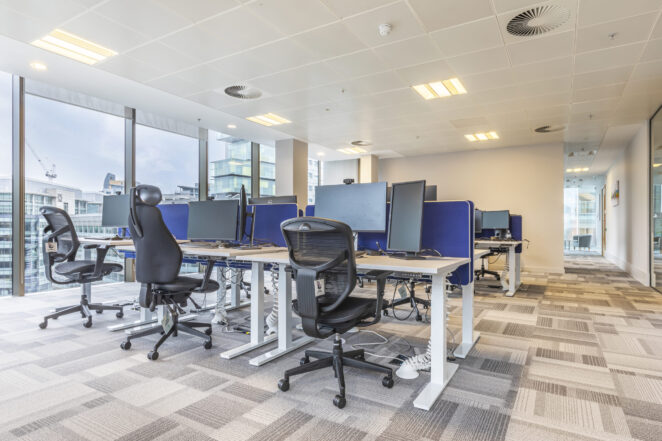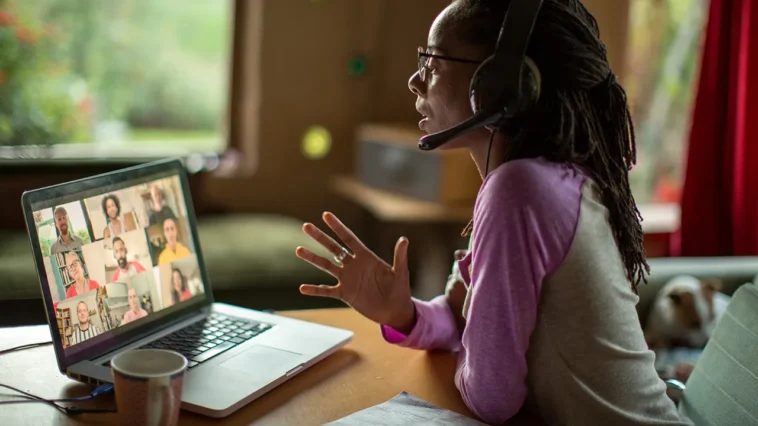Even before the pandemic, businesses were transitioning to more remote and hybrid environments. If your business is fully remote, you no longer need an office. If your business has a hybrid setup, it may need a very different kind of office space.
So how has the trend toward remote work reshaped the office market? And what comes next?
The Bumpy Road to Remote and Hybrid Environments

The journey to today’s environment, now dominated by remote and hybrid work approaches, has not been entirely straightforward. During the COVID-19 pandemic, millions of businesses were practically forced to go remote, despite not really wanting to. Millions of people who never experienced remote work before began to experience it for the first time.
The initial wave of responses to remote work was very positive, with individuals appreciating the flexibility and convenience of the arrangement and businesses appreciating the reduced overhead and potentially higher productivity. However, as time went on, individuals began to notice loneliness and stagnation, while businesses noticed a lack of camaraderie and declining productivity.
As a sort of middle ground, many businesses have now opted for a hybrid approach, attempting to capitalize on the best of both in-person and remote arrangements. These are highly variable, but often include traditional office environments for some portion of the workforce, with remote work for everyone else (for at least some days of the week).
In the war between traditional and remote work, hybrid work appears to have been the major winner, serving as a point of equilibrium in these changing dynamics.
Overall Lower Demand
As a result of the rise of remote and hybrid work, demand for traditional office environments has significantly declined. For commercial real estate investors, this has led to a much higher number of vacancies, higher management expenses, lower rent prices, and other problematic factors. That’s not to say that the commercial real estate market has collapsed; on the contrary, many investors have been able to take advantage of these conditions. But things have certainly gotten more complicated.
Office Space Transformations

One of the most pronounced effects of remote work has been a transformation of the traditional office space. Hoping to accommodate more hybrid businesses, commercial real estate investors have upgraded their properties with the following:
- Open and collaborative areas. Open, more collaborative areas are much better suited to smaller, more frequently changing teams. It also makes the space more welcoming and inviting, encouraging even the most passionate remote workers to come into the office at least occasionally.
- Huddle rooms. In-person office dynamics thrive on interaction, so commercial real estate investors are transforming their office spaces with more huddle rooms and opportunities for people to engage with each other.
- Less desk space. In most hybrid workplaces, the roster is inconsistent. Most people only come in some days of the week. People who do come in may not be there the entire workday. Accordingly, there’s no longer a need to have an abundance of dedicated desk space. There are now fewer desks in more flexible arrangements.
- Less tech/infrastructure space. With many hybrid businesses forced to rely on the cloud, there’s also less of a need to make room for technology and infrastructure. This frees up more space that tenants can use as they see fit.
- More amenities. Business owners also want to draw people into the office with more amenities and greater comforts, so commercial property managers have responded by adding them.
Coworking Spaces
Coworking spaces have also become much more popular in recent years. These spaces are designed to be flexible and accommodating for a wide range of professional needs, helping businesses, independent contractors, traveling salespeople, and other working professionals get the focused, productive space they need. With permanent and long-term tenants in shorter supply, the coworking space model becomes more attractive.
More Subleases

Long-term tenants trying to make the most of their space while also accommodating a remote or hybrid environment are also pushing for more subleases. It’s often a convenient way to subsidize a lease without presenting any major new complications.
Mixed Use Buildings
Hoping to maintain their best properties while opening up new revenue opportunities, many real estate investors have retrofitted their commercial buildings to become mixed use. In other words, these properties have both residential tenants and commercial tenants.
The Strange Dynamics of Pessimism
It’s worth noting that pessimism and risk aversion in the commercial real estate market have some interesting dynamics on the trajectory of this market.
At this point, remote work and hybrid work aren’t new phenomena. Most people are very familiar with them and most people believe that remote and hybrid work are going to become even more popular in the future. Even people completely unfamiliar with the commercial real estate market may have a reasonable suspicion that there’s less demand for traditional office spaces and that prices for commercial office buildings are experiencing downward pressure.
And truthfully, in many areas, commercial real estate is experiencing a bit of a slump. Buyers and investors recognize that demand is lower, rent prices aren’t as high, and vacancies are a serious risk. Accordingly, some investors are pulling out of the commercial real estate world, and with fewer overall buyers, prices are somewhat declining.
This presents a massive opportunity for savvy investors. With lower prices, minimal competition, and many conceivable paths to innovation in an arena that sorely needs it, the entrepreneurial potential is limitless for those willing to take advantage of it.
Just keep in mind that every geographic area is unique – and what applies to the commercial real estate market as a whole doesn’t necessarily apply to every city or every office building.
What Does the Future Hold?

What does the future hold for the office market? It’s hard to say for sure, especially since so many people were convinced that remote work was a certain, ubiquitous future just a few years ago.
However, it does seem like hybrid work environments will remain dominant for years to come – and commercial real estate investors who take advantage of this are likely to strongly benefit.




